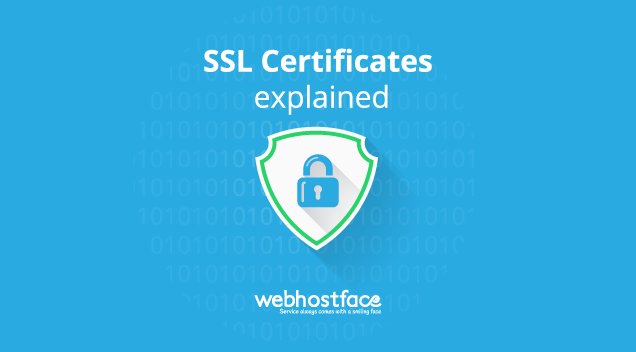Choosing the proper SSL certificate for your website could be difficult if you have never used one before. Here at WebHostFace, we understand that, so we decided to put together a little guide to walk you through the process.
What is an SSL certificate?
SSL is short for Secure Sockets Layer. It is a security protocol which adds encryption to the connection so that the transmitted data becomes unreadable by unauthorized devices.
How does SSL work?
In order to be able to read the encrypted information, the server needs to authenticate itself with the help of a certificate. This certificate contains valuable information, the specifics of which depend on the type of certificate. Via a series of messages called SSL handshake, the server, and the client agree on the algorithm of validation. After the handshake, the SSL session can be initiated.
The industry standard is 256-bit encryption SSL with 2048-bit root RSA. Named after the first letters of its creators Rivest, Shamir, and Adleman, RSA is a cryptosystem which ensures data can be read only by n intended recipient by matching a public (widely accessible) and private (unique) key.
So “how much” SSL do you need?
The first thing you want to establish is whether you are looking to secure just 1 domain or 1 domain along with all its subdomains. If you will be securing a regular website and do not use/plan on using any subdomains then a regular SSL would be best for you as it comes at a cheaper price.
If you are going to be building an online store, or your application will be handling sensitive personal data under a number of subdomains you will probably need to choose a WildCard SSL. It will cover all subdomains as well as the primary domain, so you can have multiple protected directories on the same site.
Which SSL is best for you?
As this does depend on the type of project you are running you should give some thought on which type of SSL would be best suited for you. Here are the types that you can choose from:
- Domain Validation (low-cost): The certificate issuer will confirm the validity of a domain owner. It is basically an automated process so no documents or particular actions are required on the client’s end. This certificate is the best solution for small businesses and SEO purposes.
- Organization Validation (medium range): Certificate is issued by a certificate authority only after you verify your business’ legitimacy by submitting appropriate documents.
- Extended Validation (most expensive): Certificate authority will follow a strict validation process and authenticate your business by confirming it with government records. Your project will be closely inspected before issued this type of certificate, which often takes much longer than to get any other SSL. It provides the highest authentication to your online business and gives you “Green Address Bar” in most browsers. All global websites, that handle sensitive information have that certificate, which guarantees the site is highly protected and with an impeccable reputation.
If you are not sure which SSL certificate to choose, simply contact us and we will be happy to help with your selection!



![Read more about the article Now presenting: WebHostFace PHP Tools [INFOGRAPHIC]](https://www.webhostface.com/blog/wp-content/uploads/2015/03/phptools-636x352-300x166.png)

